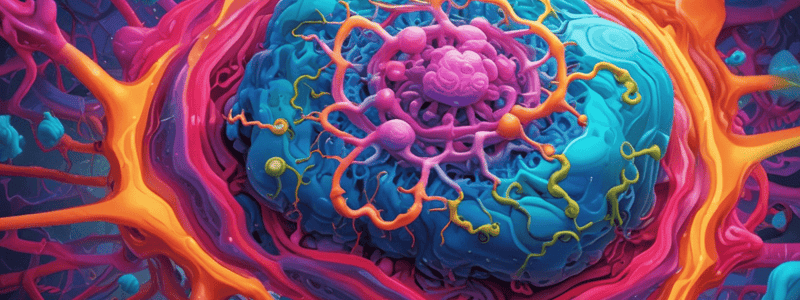Podcast
Questions and Answers
What does ecology study?
What does ecology study?
- Inheritance of traits
- Molecular interactions
- Relationships in ecosystems (correct)
- Population dynamics
Which field focuses on studying microorganisms?
Which field focuses on studying microorganisms?
- Population Biology
- Developmental Biology
- Microbiology (correct)
- Genetics
What does genetics primarily investigate?
What does genetics primarily investigate?
- Population trends
- Inheritance patterns (correct)
- Gene expression
- Organism formation
What is the main focus of molecular biology?
What is the main focus of molecular biology?
Which field looks at population growth and reproduction?
Which field looks at population growth and reproduction?
What does microbiology mainly involve the study of?
What does microbiology mainly involve the study of?
What is the main focus of biology?
What is the main focus of biology?
Which process is responsible for producing identical copies of cells during growth and repair?
Which process is responsible for producing identical copies of cells during growth and repair?
Who is known for the theory of natural selection in evolutionary biology?
Who is known for the theory of natural selection in evolutionary biology?
What is the primary focus of ecology?
What is the primary focus of ecology?
Which type of cell division produces sex cells with half the number of chromosomes?
Which type of cell division produces sex cells with half the number of chromosomes?
What recent scientific advancements have contributed to our understanding of species evolution over time?
What recent scientific advancements have contributed to our understanding of species evolution over time?
Flashcards are hidden until you start studying
Study Notes
Biology: Unraveling the Mysteries of Life
Biology is a branch of science that deals with the study of living organisms and their interactions with each other and the environment. It covers a wide range of topics, from the basic structures of cells and tissues to the complex systems that regulate our bodies and the intricate relationships between different species. In this article, we will explore the fascinating field of biology and delve into its various subtopics.
Cellular Basis of Life
At the heart of all living organisms are cells, the smallest unit of life. Biologists study cells to understand their structure, function, and reproduction. One of the fundamental processes studied is mitosis, a type of cell division responsible for producing identical copies of cells needed during growth, development, and repair. On the other hand, meiosis, another type of cell division, produces sex cells with half the number of chromosomes as the original parent cell.
Evolutionary Biology
Evolutionary biology focuses on the changes that occur in populations of organisms over generations. Charles Darwin's theory of natural selection, along with recent advances in genetics and molecular biology, have helped us understand how species evolve over time. Key concepts in evolutionary biology include genetic variation, natural selection, and adaptation.
Ecology
Ecology is the study of interactions between organisms and their environments. It includes the exploration of food webs, competition between species, symbiotic relationships, and the impact of human activities on ecosystems. By studying these interactions, ecologists can better understand the health and stability of ecosystems and predict how they may change under different conditions.
Molecular Biology
Molecular biology is a field that studies the molecules responsible for inheriting traits from parents to offspring. Key areas of study include DNA replication, gene expression, protein synthesis, and mutations. Techniques such as PCR, CRISPR, and sequencing have revolutionized our ability to analyze and manipulate genes, leading to advancements in fields such as medicine, agriculture, and environmental science.
Microbiology
Microbiology focuses on microorganisms, including bacteria, viruses, fungi, and parasites. These tiny organisms play essential roles in various ecosystems and can cause diseases in humans and other organisms. Studying microbes can lead to advancements in medicine, agriculture, and pollution control.
Population Biology
Population biology is concerned with the dynamics of populations of organisms. It encompasses aspects such as population growth, survival, and reproduction. By studying population trends, scientists can gain insights into factors influencing population size and composition, helping to guide conservation efforts and manage wildlife populations.
Developmental Biology
Developmental biology investigates the processes involved in the formation and functioning of an organism. It examines how genetic information is translated into physical traits and the complex interactions between genes, cells, tissues, and organs. This field has contributed to our understanding of human development and health.
Genetics
Genetics is a subdiscipline of biology that explores the study of inheritance patterns in organisms. It involves examining the structure, function, and transmission of genetic information from parents to offspring. Key concepts include dominance, recessiveness, and linkage, which are used to understand the mechanisms underlying inherited traits.
In conclusion, biology is a vast and diverse field with many subtopics. By studying these areas, we can gain a deeper understanding of life's intricacies and develop solutions to various problems faced by both humans and the environment.
Studying That Suits You
Use AI to generate personalized quizzes and flashcards to suit your learning preferences.




